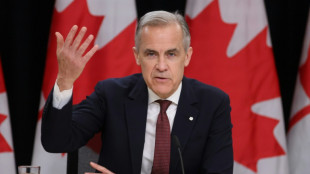

Hong Kong posts 3.1% growth, warns of trade war 'risk'
Hong Kong's economy grew by 3.1 percent in the first quarter of the year, the city's government said Friday, though it warned US tariffs had heightened "downside risks" in the global economy.
US President Donald Trump's stinging tariffs of 145 percent on many Chinese products came into force last month.
Beijing has responded with fresh 125 percent levies on American imports.
Hong Kong, a special administrative region in China with its own trade policies, has not followed Beijing's lead in imposing retaliatory tariffs.
Officials said Friday the city's economy had "expanded solidly" this year, buoyed by the mainland's growth and an increase in exports and arrivals in the first quarter.
"According to the advance estimates, real GDP grew by 3.1 percent over a year earlier, picking up from the 2.5 percent growth in the preceding quarter," a government spokesperson said.
The growth was higher than the 2.1 percent expected by economists polled by Bloomberg.
But officials warned that with the sharp increase in global tensions "the downside risks surrounding the global economy have heightened visibly".
"The extremely high levels of trade policy uncertainty will dampen international trade flows and investment sentiment, which in turn overshadow the near-term outlook for the Hong Kong economy," a spokesperson said.
But economic activities in the city will be bolstered by the local government's pro-growth measures and "sustained steady growth of the Mainland (Chinese) economy", they added.
Friday's preliminary figures showed an 8.7 percent growth in exports of goods, which authorities attributed to "sustained external demand".
Private consumption decreased 1.2 percent year-on-year -- reflecting the lingering impact of changes in residents' consumption patterns.
Authorities have set a growth goal of two to three percent for the city this year.
But Paul Chan, the city's finance chief, in April urged vigilance in the face of a "tense external environment".
"The US' bullying acts and unilateralism will continue to weigh on the global economic outlook," he wrote.
Q.al-Mutawa--BT




